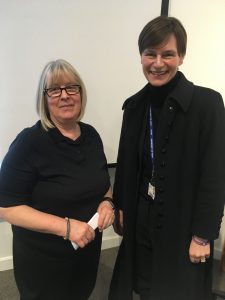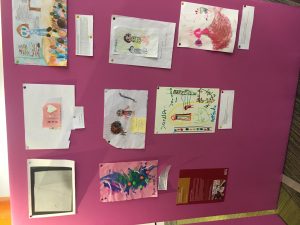For International Women’s Day this year, the Athena SWAN team hosted a lunchtime event focussed on experiences of being a parent at Kent. This included a roundtable discussion with staff who are parents and work at Kent, including VC Karen Cox, as well as a display of entries to a ‘paint your parent at work’ competition.
Through a survey completed last year, we found that some parents working at Kent felt that they had to hide that they had children, because they were concerned that they would be perceived as ‘soft’ or ‘not career focussed’. We wanted to find a way of challenging this presumption by both highlighting that there are many proud parents working at the university, and by showcasing role models of parents who have productive and successful careers.
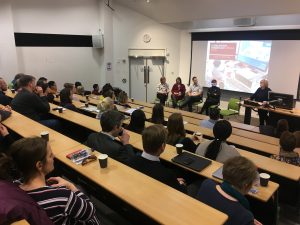
#IWD2019
The Kids’ Competition
We had a fantastic array of artwork submitted by children of university staff members, which we displayed at the lunchtime event, and that were up for public vote on the day. The overall winner was Alison Edward’s (School of Pharmacy) daughter’s submission of her mum doing ‘flossing’ in front of her students in a lecture in order to get their attention!

On Guilt, Taboos and being ‘Soft’
The panel, chaired by Professor Sarah Vickerstaff (University Athena SWAN lead), consisted of VC Karen Cox and Rob Twyman (SSPSSR), Minna Janhonen (Athena SWAN), and Alison Edwards (Pharmacy), who discussed a range of questions relating to parenting in academia. Why is being a parent perceived as ‘soft’? Is it more taboo to be “out” at work as a dad, than as a mum? Why do we as parents feel riddled with guilt? And how does having a child affect people who are not parents, who may have to ‘pick up the slack’ from those who are?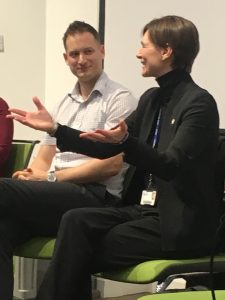
Becoming a parent for the first time inevitably brings with it challenges, and particularly at work there are multiple layers of bureaucracy to sift through; parental leave arrangements, cover for teaching, maternity/paternity/partner cover, finances, ‘keep in touch’ days and applying for nursery placements (before the baby is even born) and so on. Minna, who is a part of the Athena SWAN team, and currently pregnant, explained that her experience so far has been that policies are not always clear and straightforward and there is a lot of maths involved in figuring out parental leave. Karen discussed how she had felt a lot of guilt when she first became a parent because she was focussed on her career and she was often the last parent to pick up her children from nursery. She had a daughter whilst she was doing a PhD and another child when she became Head of School. Karen reflected that working hard and having a career is what makes her happy, and she is pleased with her choices and have realised that “if you’re happy at work, then your child will be happy too”. Allison mentioned that working out the balance between work and parenting is indeed challenging, and it will inevitably affect your career; if you have children at least 30 hours of your week will be taken up by childcare. In addition, the guilt of being a parent is not only linked to not seeing your children, but also to somehow letting your colleagues down when you have ad hoc childcare commitments, cannot attend meetings or have to request timetabling constraints due to school/nursery collections. Rob also raised how there is an underlying assumption that parental responsibility lies with mothers, and that being a dad in academia is more taboo and not discussed as much, which renders fathers invisible.
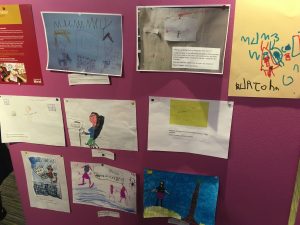
“I just don’t want to be a problem”
Society puts an ever-growing demand on people to be present at all times, whether in person or digitally and a lot of people who work part-time feel that they either do not get taken seriously as professionals/academics, or they end up working full-time hours despite being on reduced contracts. For professional services staff taking time off for childcare can be even more challenging, as these roles include less flexibility. Returning to work following parental leave can entail quite a turmoil, both emotionally and practically, and many people work themselves to the ground in order to not lose face, or as an audience member said, they ‘just don’t want to be a problem’. The panel and audience discussed that the culture in academia is that “you just get on with it” and that the perception is that “serious academics work full-time”. Contrary to this, Sarah mentioned that she worked part time when she returned to work, and both Sarah and Alison mentioned that they had promotions whilst on parental leave.
The panel continued to discuss how they have overcome obstacles to have productive and successful careers in academia as parents, noting that support from your colleagues and from other parents is very important. It is a constant balancing act between priorities, as a member of the audience put it: “It’s about working out the balance of when you go to assembly at your child’s school and when you prioritise your work”.
